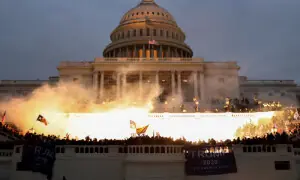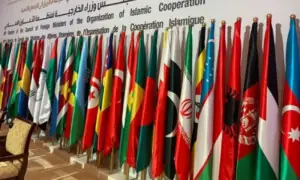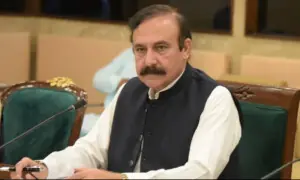SC adjourns hearing of petitions against Practice and Procedure bill till Oct 3
8 min readStory highlights
- Three-member panel comprising CJP and two senior most judges to constitute benches
- SC seeks replies from all parties/counsels by September 25
- SC live-streams Practice and Procedure bill hearing after agreement reached in full court meeting
A full court bench under new Chief Justice Qazi Faez Isa adjourned on Monday the hearing of a set of petitions against the Supreme Court Practices and Procedures bill till October 3. The larger bench, which for the first time live-streamed proceedings of the case, has sought replies from parties/counsels by September 25.
“In view of the challenge thrown to the Supreme Court (Practice and Procedure) Act 2023 and as the matter is pending adjudication. We will be consulting with two senior colleagues with regard to the constitution of benches,” the chief justice said while dictating his order and added that senior puisne judges Justice Sardar Tariq Masood and Justice Ijazul Ahsan agreed with him too.
“We are changing the date from October 2 to October 3 [Tuesday],” CJP Isa told the lawyers after being seen talking to his Justice Sardar Tariq Masood.
The date was announced after the top judge inquired when the attorney general would be back. The lawyers replied that he would be back after one week. The petitioners had sought time to give replies to the questions posed by the full court
“If you don’t mind I would love to hear it, but see there are many cases, precise it as much as you can. We will be really obliged.”
The proceedings, which started at 11:40am, were conducted for more than seven hours. The adjournment was announced at around 6:45pm.
The bill, which clips the chief justice’s powers to form benches and take suo motu notices, was stopped from taking effect in April.
The full court comprises CJP Isa, Justice Sardar Tariq Masood, Justice Ijazul Ahsan, Justice Syed Mansoor Ali Shah, Justice Munib Akhtar, Justice Yahya Afridi, Justice Aminuddin Khan, Justice Sayyed Mazahar Ali Akbar Naqvi, Justice Jamal Khan Mandokhail, Justice Muhammad Ali Mazhar, Justice Ayesha A Malik, Justice Athar Minallah, Justice Syed Hasan Azhar Rizvi, Justice Shahid Waheed, and Justice Musarrat Hilali.
The proceedings were shown on live television for the first time after the decision was taken in a full court meeting on Monday morning.
After the announcement of the date, one of the lawyers from PTI contended that the top judge had already asked the AGP to submit the record of parliamentary proceedings which so far has not been produced in the court.
To this, Justice Isa said: “We should value each other.” The lawyer replied in affirmative.
“Can I peep into your file,” the top judge asked, “you will say it’s a privileged communication between and my client. Can I ask how much your client has paid you? This is also privileged.”
The top judge said that lawyers would stuck in such things, but the lawyers contended that there was a court order. “If there is an order, he will comply. I don’t know what he will do,” said CJP Isa.
He told one of the petitioners that he would have to appear in court. The petitioner would not be allowed a video link from Lahore.
The hearing
The chief justice began the hearing by apologising for the delay in proceedings and attributed it to the proceedings being livestreamed for which the preparations had to be made.
Justice Isa observed that there were nine different petitions in the case.
As Khawaja Tariq Rahim began his arguments, the chief justice said that while there was no bar on speaking about the past, he wanted the lawyer to remain ‘focused’. He also asked Rahim to explain if he found the entire law to be wrong or had problems with only a few clauses.
As Rahim was bombarded by questions from the judges, he had to be repeatedly told to continue with his arguments and answer the questions at the end instead of breaking off at every interruption.
Rahim argued that his petition was brought to the court in the interest of the public. However, the chief justice asked him to make arguments rooted in the Constitution.
Rahim added that he supported the formation of a full-court bench and Justice Isa replied that it had seemed ‘most appropriate’.
However, Justice Ayesha Malik asked what would happen to the right of appeal and who would hear it against a decision of the full-court.
Justice Akhtar then wondered if Parliament could whittle down judicial power under Article 184(3) by providing that a committee, comprising three senior judges, be formed to decide the constitution of benches.
After much sidetracking, in which Rahim was assisted by one of his associates in noting down the questions posed by the bench, the lawyer finally said that sections 5, 6, and 7 of the act were ultra vires the Constitution.
Advocate Imtiaz Rashid Siddiqui came to the rostrum next and began by saying that the real question was whether the trichotomy of power allowed the parliament to make laws that affected the court.
However, Justice Isa asked him to first explain how the law’s passage amounted to an infringement of the fundamental rights of citizens.
Attorney General Mansoor Awan argued against the maintainability of the petitions under Article 184(3). He said that the two provisions of the article regarding fundamental rights and matters of public interest were interlinked. He said petitions challenging the practice and procedure bill did not meet the criteria.
He also argued that the law did not pose a threat to the freedom of the Supreme Court since no powers had been handed to any external elements.
Awan said that the law had been brought to ‘democratise’ the Supreme Court and bring about more transparency.
After hearing arguments from two lawyers, the court decided to take a short break. Justice Isa said he would like to hear from a lawyer who said he was from the PTI.
‘Admit that we have made mistakes’
While defending an argument for Article 184(3) of the Constitution, Justice Isa interrupted and reminded that everyone was grownups.
“The problem arose. I think thousands of articles have been written, lawyers have spoken about it, and we keep talking about two chariots, but let’s put some emphasis on the lawyers who also say there have been allegations and I can deny it, but it does not. Public opinion thinks that 184(3) has been misused, jurisdiction has been exceeded,” he remarked.
He interpreted the AGP’s argument by saying that “We did not create the mess. You created the mess. We are trying to solve your mess.” He added that the three-member bench under Article 184(3) would be final.
The top judge added that they were concerned about full courts only, but then what about the three-member bench judegment. He reminded the AGP that a three-member bench gave a decision in the Reko Diq case.
“Three-member bench is the normal smallest bench in the Supreme Court. So what could you do nothing,” he said and added that the bench now has to find ways and means because the “interest of the country was at stake”.
CJP Isa said: “I would rather surrender my highest status and place it at the feet of the taxpayer people of Pakistan, rather than give them a whopping liability of $6.5 billion because of the independence of the judiciary. They will what are you talking about independence of the judiciary, the independence of Pakistan will disappear if you will labour this much debt on Pakistan. It is not easy. We don’t understand the repercussions of things.”
He went on to add, “We make mistakes”. While talking about the review jurisdiction, the top judge mentioned the case of former prime minister Zulfikar Ali Bhutto where the SC was split but the review was unanimous.
“It is an error floating on the record,” he said and mentioned that they could be rectified through review. “You had to create 184(3).”
CJP Isa advised the AGP to simply ask the top court to work in their domain as such legislation would not have been needed. “We have also made some mistakes. Our problem is that our ego is bigger. We have made mistakes. I have made mistakes. Admit that mistakes have been made. We have justified military takeovers. Admit that we have made mistakes, otherwise, the Constitution has no value.”
He called for seeing a larger picture.
Government submits reply
The federal government submitted its reply in the case on Monday, requesting the court to declare petitions against the bill were not maintainable.
The written reply said that the parliament reserves the right to legislate under Article 191 and that the bill would not affect the freedom of the judiciary in any way.
What is the SC Practice and Procedure Bill
On March 30, the Senate passed the Supreme Court (Practice and Procedure) Bill 2023. The bill was aimed at clipping powers of the office of the CJP to take suo motu notice in an individual capacity and exercise discretion in forming benches.
While mentioning the constitution of benches, the bill stated that every cause, matter or appeal before the apex court would be heard and disposed of by a bench constituted by a committee comprising the CJP and the two senior-most judges, in order of seniority. The decisions of the committee would be taken by a majority, it added.
The bill said that any matter invoking the use of Article 184(3) of the Constitution would first be placed before the abovementioned committee.
“Without prejudice to the provisions of Article 199, the Supreme Court shall, if it considers that a question of public importance with reference to the enforcement of any of the Fundamental Rights conferred by Chapter I of Part II is involved have the power to make an order of the nature mentioned in the said Article,” states Article 184(3) that pertains to the Original Jurisdiction of Supreme Court.
“If the committee is of the view that a question of public importance with reference to enforcement of any of the fundamental rights conferred by Chapter I of Part II of the Constitution is involved, it shall constitute a bench comprising not less than three judges of the Supreme Court of Pakistan which may also include the members of the committee, for adjudication of the matter,” the bill read.
For the latest news, follow us on Twitter @Aaj_Urdu. We are also on Facebook, Instagram and YouTube.

























Comments are closed on this story.